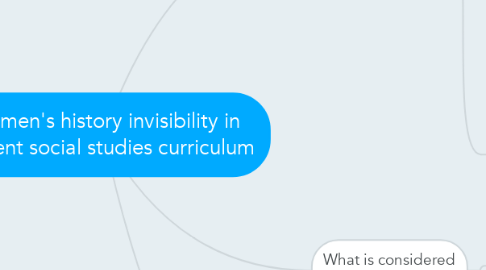
1. Why do we teach history
1.1. To support the creation of one's identity (NCHS:1996)
1.2. National Discourse
1.2.1. History as the ideologically influenced knowledge that creates the idea of a nation (critical theory)
1.2.1.1. Objective: free army that defends the ownership of the land corresponded to the nation (critical theory)
1.3. Knowledge that helps students understand the world they live in (NCHS:1996)
1.4. Understanding different cultures for a better communication and coexistance (NCHS:1996)
2. Genders Representation
2.1. Masculine
2.1.1. men
2.1.1.1. Economically Independent
2.1.1.2. Legally Independent
2.1.1.3. Public Spaces
2.1.1.4. Powerful
2.1.1.5. Politically Active
2.2. Femenine
2.2.1. women
2.2.1.1. Economically dependent of men
2.2.1.2. Legally Dependent of men
2.2.1.3. Private Spaces
2.2.1.4. Oppressed
2.2.1.5. Polically Oppressed / passive
2.3. LGBTQ and TT
2.3.1. New therminologies and labels
2.3.1.1. Their voices aren't even considered in history
2.3.1.2. Could deconstruct the binomial Female / Male and the power imbalance attached to their concepts
3. What is considered history
3.1. Who wrote / create Ancient primary sources
3.1.1. Rich, powerful men
3.1.1.1. What were they doing?
3.1.1.1.1. Control the economical, political and religious spheres
3.2. Who interpreted the Ancient primary resources
3.2.1. High class and educated men
3.2.1.1. Which kind of knowledge were they creating from the primary sources
3.2.1.1.1. Understandings around the economical, political and religious high class spheres
3.3. Who learn its socially constructed meaning
3.3.1. Educated people, men and women.
3.3.1.1. Which kind of knowledge did they received?
3.3.1.1.1. Economical, political and religious powerful men issues
